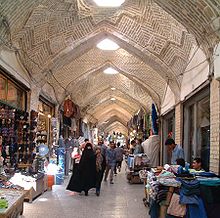- Etiquette in the Middle East
-
 The Middle East contains a multitude of societies with different traditions regarding etiquette. Bedouins like this young man wearing a fez are traditionally renowned for their hospitality.
The Middle East contains a multitude of societies with different traditions regarding etiquette. Bedouins like this young man wearing a fez are traditionally renowned for their hospitality.
Many matters of etiquette in the Middle East are connected to Islam as it is written in the Qur'an and how it has been traditionally understood and practiced throughout the centuries. Prescribed Islamic etiquette is referred to as Adab, and described as "refinement, good manners, morals, ethics, decorum, decency, humaneness and righteousness".[1]
As such, many points discussed in this article are applicable in other regions of the Islamic world. This holds especially true in Muslim majority countries outside Middle East.
The Middle East is home to many people who follow faiths besides Islam. Most notable among them are the churches of Eastern Orthodox Christianity, Copts and other adherents of Oriental Orthodoxy, Maronites, Melkites and other Catholics of the Eastern Rites as well as the Roman Rite, Zoroastrians, Bahá'ís, and various Jewish denominations.
In many cases, however, Muslims and non-Muslims in the Middle East will share characteristics, whether it is the prohibition against pork ordained by both Islamic and Jewish dietary restrictions, a preference for the beverage widely known elsewhere as "Turkish coffee", or knowledge of how to conduct business in a crowded souk without being cheated. As coexistence, rather than conflict, has been the norm between people in the Middle East throughout much of history, it is a place where people with different beliefs often share the same traditions.
Points of etiquette
Although the Middle East is a large expanse of geography with a variety of customs, noting the following points of etiquette can be useful when dealing with people around the world who have been raised according to the traditions of the Middle East or, in some cases, Muslim societies elsewhere.
- Conducting business effectively in a souk or bazaar requires an understanding of how to haggle like the locals. This is an art requiring participants to be appropriately aggressive, keen to how much should be offered at a given point in a transaction, etc.
- The modesty of one's personal attire is of great concern to many in the Middle East, although the parameters of this modesty vary. In Saudi Arabia, for example, many families expect all female members to wear a hijab while even men and women visiting from other cultures should wear very non-revealing clothes to avoid harsh confrontation. In another example, males and females in shorts, skimpy t-shirts or other "immodest" clothes might find themselves evicted from a variety of places, especially holy sites (be they tended by Muslims or Jews). Get specific guidelines from locals when possible.
 Middle Eastern societies have many rules of etiquette regarding modest clothing - especially head coverings. This Muslim woman in United Arab Emirates wears a niqab, a variety of headscarf popular throughout the Middle East.
Middle Eastern societies have many rules of etiquette regarding modest clothing - especially head coverings. This Muslim woman in United Arab Emirates wears a niqab, a variety of headscarf popular throughout the Middle East.
- Regarding head attire specifically, the etiquette at many Muslim holy sites requires that a headscarf or some other modest head covering be worn. For women this might be a hijab and for men it might be a taqiyah (cap), turban, or keffiyeh. A kippah or other head covering is expected for men in synagogues and other places where Jews pray. Orthodox Christian sites might require the removal of hats by men but will expect women to cover their hair with a kerchief or veil.
- Among Muslims, the left hand is reserved for bodily hygiene and considered unclean. Thus, the right hand should be used for eating. Shaking hands or handing over an item with one's left hand is considered an insult.[2]
- Public displays of affection between people of the opposite gender, including between married people, are frowned upon everywhere more conservative values hold sway. Public displays of affection include activities as minor as hand-holding.[3]
- In many cases, people of the same gender holding hands while walking is considered an ordinary display of friendship without romantic connotations.[4]
- In a related point, many people in the Middle East claim a more modest amount of personal space than that which is usual elsewhere. Accordingly, it can seem rude for an individual to step away when another individual is stepping closer.[5]
- Special respect is paid to older people in many circumstances. This can include standing when older people enter a room, always greeting older people before others present (even if they are better known to you), standing when speaking to one’s elders and serving older people first at a meal table. [2]
 Hospitality is held in high regard throughout the Middle East. Some hosts take pride in the laborious preparation of what is known in Europe as “Turkish coffee”, grinding fresh-roasted coffee beans to a fine powder, dissolving sugar and carefully regulating the heat to produce a result that meets exacting standards.
Hospitality is held in high regard throughout the Middle East. Some hosts take pride in the laborious preparation of what is known in Europe as “Turkish coffee”, grinding fresh-roasted coffee beans to a fine powder, dissolving sugar and carefully regulating the heat to produce a result that meets exacting standards.
- Many people throughout the Middle East, especially Persians and Arabs, take great pride in shows of hospitality, never failing to at least serve chai, coffee and a snack such as figs but preferring to present guests with a lavish choice of expensive delicacies in abundance. To refuse such hospitality can cause offense.
- In some areas in the Middle East, it is common for people to take their food from a common plate in the center of the table. Rather than employing forks or spoons, people may scoop up hummus and other foodstuff with pita bread.
- In many Middle Eastern countries, grouping the thumb and fingers together, and shaking it up and down, fingers pointing upwards, indicates "wait".
- In Iran, the "thumbs up" gesture is considered an offensive insult[2]
- Displaying the sole of one's foot or touching somebody with one's shoe is often considered rude. This includes sitting with one's feet or foot elevated. In some circumstances, shoes should be removed before entering a living room.[6]
- Many in the Middle East do not separate professional and personal life. Doing business revolves much more around personal relationships, family ties, trust and honor. There is a tendency to prioritize personal matters above all else. It is therefore crucial that business relationships are built on mutual friendship and trust.[7]
- Responding to an anger or seriousness with light laughter or a smile is common. This must not be seen as an indication that the other person is not taking you or the situation seriously.
- A common custom in many Middle Eastern countries is 'tarof' (or taarof) which can be translated as 'offering'. It is common for a person not to accept an offering (food, beverages etc.) the first or possibly second time, instead taking up the offer the third time. This traditionally implies dignity, self-respect and respect for the host. In addition, if there is only one item of food left, the host must offer, or taarof it, to everyone, regardless of whether or not he or she wants it. Finally, it is considered rude if a person gets food for himself or herself without bringing some for the guests.
- Positioning yourself so your back is not facing another person is customary in Iran and Iraq. If a person's back is facing another person, he or she must excuse himself or herself.
See also
References
- ^ Firmage, Edwin Brown and Weiss, Bernard G. and Welch, John W. Religion and Law. 1990, page 202-3
- ^ a b c Airman's Quarterly Spring 2006
- ^ Nydell, Margaret (2006), Understanding Arabs: A Guide for Modern Times, Boston, Massachusetts: Intercultural Press, p. p.45, ISBN 9781931930253, http://books.google.com/?id=ZNoiieefqAcC&pg=PA45&lpg=PA45&dq=married+couples+holding+hands+saudi+arabia, retrieved 2009-05-25
- ^ Cultural Tips Per Audia AZ
- ^ "Are You the Ugly American?", Budget Travel
- ^ The First Three to Five Seconds: Understanding Arab and Muslim Americans Part II, USDOJ
- ^ Doing Business in the Middle East
Categories:- Etiquette lists
- Etiquette
- Islamic culture
- Middle Eastern culture
Wikimedia Foundation. 2010.

